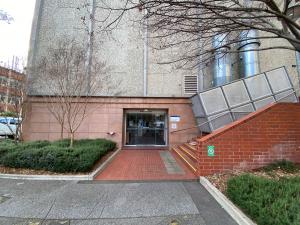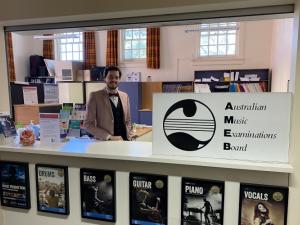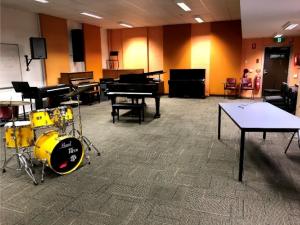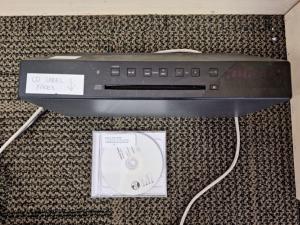AMEB Social Stories
Help navigating candidates through the exam experience
If you’ve been enrolled in an exam, you can use these stories to help you feel more comfortable about taking your exam and make your experience a positive one. The following information is intended to help you feel better prepared for your upcoming exam experience.
-
Finding out when your exam will be
The person that enrolled you (usually a parent or teacher) will receive an email notifying them that your exam date has been scheduled. They can log into SCORE to look at the exam notification letter and then tell you where and when your exam is.
If you have an accompanist, make sure they know when and where the exam will be.

-
Finding where your exam will be
Take note of where your exam is. It could be at the Central Venue (University of Adelaide for exams in SA) or at a Private Venue such as your school or your music teacher’s house.
If your exam is at the University of Adelaide, there is a map online to help you know where to go.
https://www.adelaide.edu.au/ameb/ua/media/223/ameb-exam-map_0.pdf

You can also watch videos to see how to get to buildings like Hartley, Schulz or Madley on weekends and on weekdays. You can refer to these at any time before the exam.
Hartley (weekdays): https://youtu.be/US07s0Rb-i0
Hartley (weekends): https://youtu.be/ujU4qNV6MEc
Schulz (weekends): https://youtu.be/ujU4qNV6MEc
Madley Jazz Studio: https://youtu.be/YahzMKnlpz4
Madley Rehearsal Space: https://youtu.be/RHfFbb4da0A
If you have a heavy instrument or find walking up steps hard, and your exam is on a weekend in the Hartley building, Schulz building or Madley Rehearsal Space, our supervisors can let you through the Hartley building without having to take stairs.
-
Submitting your list of pieces/program (repertoire)
Before your exam you can submit your repertoire in SCORE with your parent or teacher. You can do this any time until 72 hours before your exam day. If you are a Speech diploma candidate, you will need to submit your repertoire two weeks before your exam.

-
Preparing your sheet music
If you’re doing a practical music exam, check that each piece of music you will bring to your exam is an original copy. There are special rules for Own Choice pieces that you can check in the syllabus in the Repertoire exam section for your instrument.
You can make copies of pages that help you with page turns, if needed.

-
Erasing General Knowledge markings
Make sure that you have erased General Knowledge markings from your music. These include any definitions or answers to questions examiners could ask. You can keep any fingering or articulation marks that you or your teacher have added.

-
Submitting your list of pieces/program (repertoire)
Your examiner will need to know what you are going to play for them. Submit your list of pieces online in SCORE (up to 72 hours before the exam day) or write them out on the second page of a printed Exam Notification Letter, ready to bring to your exam.
If you’re doing a For Leisure (Comprehensive) exam, you will get a choice between doing Aural tests or Sight-reading. Talk to your teacher about these and work on a plan of what to do, together.

-
Thinking about piece/program order
Talk with your teacher about what order you think it’s best to present your pieces/program. Usually, the examiner asks you what you’d like to perform first, so it’s good to have an idea. Pieces requiring an accompanist or collaborative artist will often be performed first.
-
Plan how you'll get to your exam
Check that you know where to go for your exam. If you have an accompanist, check they know when and where the exam is.
If you’re under 16 years old, talk to your parent or support person about how you will be getting to the exam with them, for example by car, bus or tram.
Aim to arrive 15 minutes before the exam time.

by geralt via Pixabay
-
Rehearsing the exam mentally, and with your teacher
It’s helpful to recreate the exam experience in your head (without your instrument) and think through everything in detail from start to finish, pretending you’re there. Do this in a peaceful environment and think positively about each part of the exam, telling yourself that you can do it! This is called mental skills training, and athletes and surgeons do it too. It helps get you ready for the real thing.
Try to run through the components of the exam with your teacher, too, and this will help give you an idea of what to expect. You may like to try recording yourself playing and listen back to this with your teacher. Your teacher may even try a practice exam with you to help you prepare for the real thing.
You can do both these things a few days before the exam, or even earlier.

by DeltaWorks via Pixabay
-
Getting a good night's sleep beforehand
The day before your exam is an important time to make sure that you will be feeling your best tomorrow. Try to stay hydrated and get a good night's sleep so that you will be well-rested and feeling prepared.

by SashaSan via Pixabay
-
Preparing before you leave the house
Check that you have everything you need, such as:
- Original copies of your music
- Your technical work book (if you need it)
- Your instrument (if it's not piano) and any accessories for your instrument such as a bow, reed, footstool or anything else you might need
- Your Exam Notification Letter
- A water bottle (optional)
- Recorded accompaniment (if applicable) and a device to play it on
Arrive at the venue 15 minutes before your scheduled exam time.
Try not to practise or rehearse too much on the day of the exam. It's good to save your energy for the exam.

by Memed_Nurrohmad via Pixabay
-
Arriving at the exam venue
When you arrive at your exam venue, you will need to check in with the venue supervisor. If your exam is at a private venue, then the supervisor could be the school administrator, your teacher or someone else responsible for making sure everyone arrives and is ready to be examined.
If your exam is at the Central Venue, check in with one of our friendly staff or supervisors in the office or the waiting area.
-
Waiting for your exam
Once you have checked in, you will be asked to wait in the waiting area with your parent or support person.
If your exam is at the Central Venue and you're doing a piano exam that's Grade 7 or lower, you will wait in the waiting area until your exam.
If your exam is at the Central Venue and you're doing another subject such as Grade 8 and above piano or an exam on another instrument, the supervisor will show you to another room to warm up. Your accompanist (if you have one) will join you in the warm-up room.
-
Going into your exam
When it’s your turn, the examiner or the supervisor will let you into the exam room. Your parent, teacher or other support person will need to stay in the waiting room, unless you’re doing a P Plate Piano exam.
When you enter the exam room, there are certain things you can expect to see. You should see a piano (if you’re doing a practical music exam), and a desk for the examiner to sit at. There will always be a window to see through, though sometimes this might be a window in the door. If you play an instrument that requires a seat or music stand, one will be provided for you.
-
Meeting the examiner
The examiner will smile and say hello and might ask how you're going.
You can say hello to your examiner as you come into the room as well. They might check your name and ask which exam you are doing.
If your exam is on an instrument other than piano, or is in voice, then you will probably enter the room with your accompanist/collaborative artist, so you can present the part of your program that involves you both. The examiner may ask which section of the exam you would like to begin with. This could be technical work (if your exam requires this) or your pieces.
If you are a piano student, you can ask to quickly test out the piano before you start to play. Your examiner knows you have probably not played on this piano before.
-
Performing in your exam
While you’re performing, your examiner will be busy taking notes on paper or on a device. This is to give you constructive feedback but also to record all the things you are doing well. When it comes time to move to another section of the exam, the examiner will give you instructions. If there’s an instruction you don’t understand, you can ask the examiner to repeat what they have said or explain it in a different way.
-
Answering questions in your exam
Unless you’re doing a Repertoire or P Plate exam, your examiner needs to ask you questions as part of the exam. If you need your examiner to repeat something or ask a question in a different way, you can ask them to. They are there to support you and to help you perform and do your best.
If you need to take a sensory break or some extra time to settle yourself, you can ask your examiner for this. If this is something you sometimes need, your parent or teacher will have mentioned this when they enrolled you, and the examiner will know.
Some exams require sight reading. You’ll be given music you haven’t seen before and the examiner will let you look at it for 30 seconds to 1 minute. When the time is up, they will ask you to play what you can from the music.
Some exams require aural tests. The examiner will play these on the piano (or device) for you to listen to and respond. You might be asked to stand away from the piano so that you can’t see the piano keys or sheet music.
Some exams require General Knowledge. Your examiner will look through your pieces and choose different signs, symbols and terms to ask you questions about. They might ask you about the composer of your piece or the time in history when it was composed.
If you make a mistake in your exam, try to keep going. This will help your examiner to see what you are capable of.
-
Finishing your exam
Once you have finished with all the sections of your exam and your examiner tells you that you are done, they will say goodbye and you can walk back out to the waiting area and find your support person.
-
Getting your report
Your examiner will need time to write up your report, so it will be sent to your enroller afterwards. They will receive a notification that your report and result are ready to check in SCORE. This can take up to 2 weeks.
-
Reading the report
The report will outline what you did in the exam and the examiner’s comments. At the bottom of the report the examiner will have assigned a result to your exam. The comments and result are something you can discuss with your teacher, to help you focus on what you do next in your lessons.
Exams are about doing your best and giving you goals and milestones to continue to develop as a performer. They also help you get better at coping in situations that can be nerve-wracking. You can feel proud of yourself for working hard towards a goal and doing an exam!

by Paul_Stachowiak via Pixabay
-
Getting your certificate
After your report has been released, your enroller will receive an email that your certificate is ready. Certificates can be collected at the AMEB Office. If you live outside the postcodes 5000-5199, your certificate will be posted to you automatically. Rockschool certificates are provided as an e-Certificate and your enroller will receive an email when the e-Certificate has been uploaded to your enrolment.
















